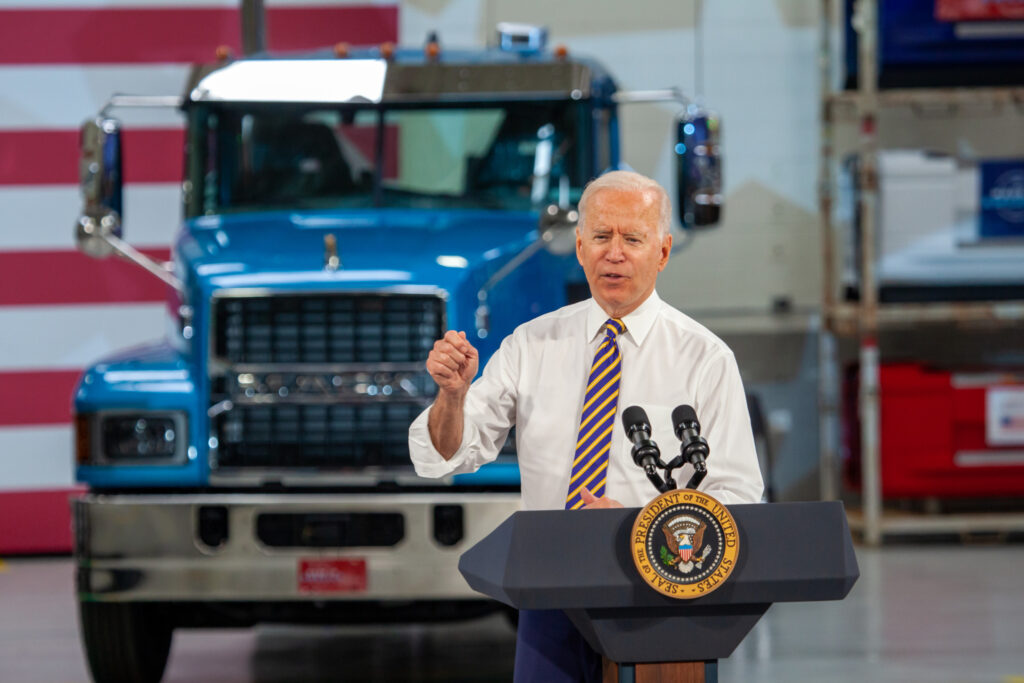Trucking, supply chain concerns on minds of U.S. voters ahead of midterms: Poll
Trucking and supply chain issues could be lining up as key factors in U.S. midterm elections in 2022, a recent poll suggests.
Polling data released earlier this month by the Consumer Brands Association and Morning Consult focused on key states of Arizona, Georgia, Nevada, and New Hampshire, where responding residents agreed supply chain bottlenecks are “major” or “big” issues.

An overwhelming majority in New Hampshire (92%), Arizona (89%), Nevada (89%) and Georgia (89%) said it is important to expand trucking capacity next year to meet supply chain demands.
Their Top 5 answers to truck capacity were identified as creating “air traffic control” to match empty trucks and available loads; offering Hours of Service flexibility to truck drivers; allowing reasonable increases in truck weights; funding for driver recruitment and training; and funding to accelerate production of new trucks.
No longer invisible
“Once invisible to consumers, the pandemic and holiday shipping crunch have unmasked the supply chain and made it kitchen table conversation,” said Geoff Freeman, president and CEO of Consumer Brands, in a press release. “Voters have exhausted their patience with years of government inaction, and elected officials can’t afford to lose sight of the supply chain after New Year’s Day.”
“There has been significant attention on the ports in recent months, offering a playbook for how government can play a role in easing supply chain pressure,” said Freeman. “However, too much focus on one link in the chain only serves to relocate bottlenecks, not solve problems.”
The results were based on 2,372 responses collected from Nov. 24 to Dec. 8.
Sixty-nine percent of surveyed voters in Arizona and Georgia were more likely to back candidates who support options to increase trucking capacity. The same holds true for 68% of voters in Nevada and New Hampshire.
The midterm elections will see races for 435 seats in the U.S. House of Representatives and 34 out of 100 seats in the U.S. Senate.
Under control?
President Joe Biden has argued that supply chain issues are under control.
“Packages are moving, gifts are being delivered, and shelves are not empty,” he said in a White House briefing, reported by media outlets such as CNN on Wednesday.
But trucking issues are clearly drawing political resources south of the border.
The Biden Administration has introduced initiatives such as moving the Port of Los Angeles to 24/7 service to help address bottlenecks. And a recently announced Trucking Action Plan has been unveiled in a bid to support and expand access to truck driving jobs. It includes initiatives to expedite licensing processes, expand apprenticeships, focus on recruiting veterans, and launch a wide range of industry outreach through the Driving Good Jobs initiative.
The plan will also see the U.S. Federal Motor Carrier Safety Administration (FMCSA) and Department of Labor studying truck driver compensation, including the time drivers spend waiting to pick up or drop off freight without getting paid.
Trucking groups such as the American Trucking Associations have also been lobbying against federal plans to introduce vaccine mandates for border-crossing truck drivers as well as any businesses with more than 100 employees, arguing that the mandate will push unvaccinated drivers out of the supply chain.
Have your say
This is a moderated forum. Comments will no longer be published unless they are accompanied by a first and last name and a verifiable email address. (Today's Trucking will not publish or share the email address.) Profane language and content deemed to be libelous, racist, or threatening in nature will not be published under any circumstances.
A lot of people asked about why a tired driver got a 110 years
Wanna know something? Accelerated licensing initiatives injures and kills people. At least two years of proven no at fault accidents/incidents should be a pre-requisite. Basically, if you’re from another country, where there’s no reciprocal licensing agreement, and you don’t have a verifiable record (like an NSC/CVOR or abstract), is there any reassurances that individual will become a safe truck driver? I don’t know the answer, and nobody else knows. However, a two year proving period should filter out those who really need “more experience and more practice” before handing the keys to an 80,000 lbs machine.
If, of anything, that should be done to accelerate licensing, is that it should be focused towards veterans and those with CDLs/ classified licenses of other types. For example, bus drivers already know that driving a large vehicle requires a certain degree of discipline. However, many of those who go from a small car (like driving your typical Dodge Ram truck) to a semi, there’s a bigger learning curve.
Mandatory apprenticeship or some kind of graduated licensing should be something that should be seriously considered. That is something that is beyond the comprehension of any brass/bean counters/white collar representatives of any Trucking Associations but well respected or understood by us, the professional truck drivers.
-
You are so right too many people are foreign students being put in trucks as a way for larger trucking companies to save money. E logs are needed for these people. When I first got my permit to drive dispatch pushed me hard when it was not safe.
Good Good Good